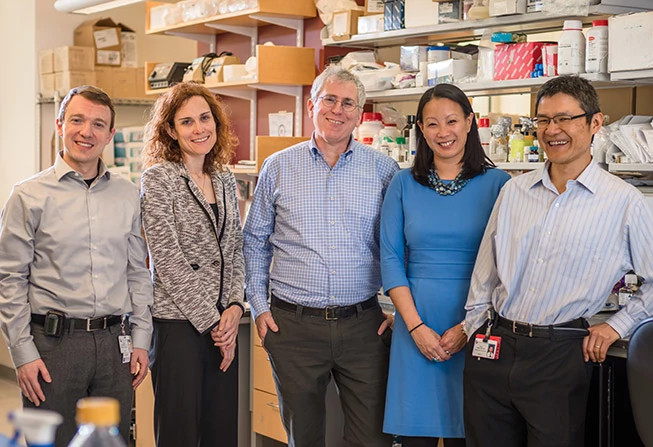Personalized Treatment
The promise of personalized medicine is the ability to tailor individual treatments to specific cancer-causing mutations in individual patients, with the overarching goal of improving survival and outcomes. The Young-Onset Colorectal Cancer Center will accomplish this through two unique and important initiatives.
The GI TARGET Program: GI Treatment Assistance Regarding Genomic Evaluations of Tumors
The GI TARGET program in the Young-Onset Colorectal Cancer Center will map out the mutations in young-onset colon and rectal tumors using Dana-Farber's cutting-edge, in-house sequencing technologies. We have one of the nation's most comprehensive precision cancer medicine initiatives, with a large database of tumor genomic profiling data linked to clinical information for discovery of new drug targets and delivery of personalized cancer medicine.
A multidisciplinary molecular tumor board will review the genetic profiles of young-onset colorectal cancer patients seen at Dana-Farber and generate a customized, comprehensive report summarizing the mutations discovered in each patient's cancer, along with recommendations for personalized treatment with targeted therapies. This report will also include matches to ongoing clinical trials and will be updated regularly for certain subsets of patients receiving active treatment at Dana-Farber.
Living Biobank
Using tumor tissue collected at surgery or during a biopsy, the Young-Onset Colorectal Cancer Center will create “avatars” of individual patients' cancers in the laboratory with the overarching goals of guiding personalized treatment recommendations and studying the biological characteristics of an individual's cancer. This “living biobank” of patient-derived cell lines, tumor organoids, and mouse models will serve as a powerful tool for selecting the most promising new treatments for testing in clinical trials and will hopefully speed up the timeline for making effective treatments available to patients.
Laboratory Models of Cancer
A good laboratory model of cancer that closely mimics the human tumor environment is required to guide clinical decision-making and evaluate novel therapies for colorectal cancer. As no one model succeeds in mimicking the human colorectal tumor environment, the Young-Onset Colorectal Cancer Center uses multiple laboratory models to conduct its research projects and is actively working on innovative ways to model the immune system and microbiome together with cancer cells in the laboratory. This will enable scientists to better assess the efficacy of new therapies to target the immune system and microbiome for the treatment of colorectal cancer.
Microbiome
The microbiome is a collection of trillions of microorganisms, mostly bacteria, found throughout the human body, with the largest community living in the gut. Recent studies have revealed that these bacteria may play a role in how colorectal cancers develop, as well as how they respond to treatments (including immunotherapy) and contribute to treatment-related side effects.
As part of an international team, scientists in the Young-Onset Colorectal Cancer Center are studying the differences between a healthy microbiome and one that is associated with colorectal cancer, as well as the influence of dietary and lifestyle factors on the composition of the microbiome, to find ways to manipulate this collection of bacteria to better prevent and treat colorectal cancer. They are also interested in identifying differences in the microbiome of young-onset colorectal cancer patients, as compared to older colorectal cancer patients, in order to provide clues for developing novel ways to treat cancer in young adults. The team will test innovative strategies to target the microbiome with sophisticated antibiotics, vaccines, and transfer of healthy microbes.
Interested young adults with colorectal cancer are invited to participate in these exciting research studies by donating blood, stool, and tumor specimens during their treatment and care at Dana-Farber.
Immunotherapy
While immunotherapy has shown great promise in treating some solid tumors, such as lung cancer and melanoma, checkpoint inhibitors have not yet been successful in treating the most common type of colorectal cancer. This lack of success is believed to be due to the immune-suppressive tumor microenvironment. Researchers in the Young-Onset Colorectal Cancer Center are collaborating with scientists across multiple institutions to comprehensively map the individual cell types that are present in colorectal tumors, with the overarching goal of identifying the underlying reasons for the immune-suppressive environment. Knowledge of these factors will lead to novel drug targets and development of new immunotherapies for the treatment of colorectal cancer.
Screening and Early Detection
Colonoscopy is the definitive test for detection of precancerous polyps and cancers, as it allows for diagnosis, biopsy, and/or removal of lesions all with one study. However, disadvantages of colonoscopy include the need for anesthesia and bowel preparation, risk of bleeding and perforation, high cost, and relative inconvenience of the procedure. These limitations have impacted the adherence to colorectal cancer screening, with only approximately 60 percent of people in the U.S. following established guidelines.
Consequently, there is a need for novel, non-invasive tests that will increase the willingness and ease of participation in colorectal cancer screening, so that more cancers can be prevented and/or detected at an earlier stage. The Young-Onset Colorectal Cancer Center is working on a number of research projects in conjunction with gastroenterologists and lab scientists to tackle this problem, for example by evaluating circulating tumor DNA (ctDNA) mutations and methylation patterns. The goal is to identify individuals at risk early on for disease screening.
As a patient, we invite you to participate in these innovative and cutting-edge studies that will further the field to improve prevention, screening, early detection, and novel treatments for young-onset colorectal cancer.
Ongoing Colorectal Cancer Clinical Trials at Dana-Farber
At Dana-Farber, we have many clinical trials for patients diagnosed with colorectal cancer. In addition to participating in studies that are focused on younger colorectal cancer patients, you may also benefit from participating in a clinical trial geared to colorectal cancer patients of all ages. Our physicians will work with you to determine if there is a clinical trial that is right for you.
You can view all open clinical trials and search by your cancer type.
